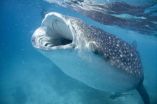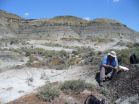(Press-News.org) Holidaymakers' photos could help scientists track the movements of giant endangered sharks living in the waters of the Indian Ocean. A new study, led by a researcher from Imperial College London, is the first to show that these publically sourced photographs are suitable for use in conservation work.
Tourists scuba diving and snorkelling in the Maldives frequently take underwater pictures of the spectacular and docile whale shark, often called the world's largest fish. Conservationists have long hoped to use this photographic resource to help them trace the sharks' life history, relationships and geographic distribution, although the value of these amateur snapshots has never been properly measured.
Tim Davies of Imperial's Department of Life Sciences is the lead author on a study published in Wildlife Research, the first to examine how reliable photographs sourced from the public actually are. He and his team did this by comparing results using tourist images with results based on surveys by marine researchers specifically aiming to track the sharks.
In order for a shark to be clearly identified, any photograph must capture the distinctive pattern of spots located directly behind the gills. This unique marking serves as a 'fingerprint', which can then be scanned with a computer programme to tell the animals apart.
The study looked at hundreds of images taken by the public, of which many were downloaded from image-sharing websites such as Flickr and YouTube. Individual whale sharks could be successfully identified in 85 per cent of cases, surprisingly close to the 100 per cent identification possible in photographs taken by researchers.
Speaking about the results, Davies said: "Globally, this outcome provides strong support for the scientific use of photographs taken by tourists for whale shark monitoring. Hopefully, this will give whale shark research around the world confidence in using this source of free data. In the Maldives in particular, where whale shark tourism is well established and very useful for collecting data from throughout the archipelago, our results suggest that whale shark monitoring effort should be focused on collecting tourist photographs."
Although they are widely thought to be rare, the conservation status of the whale shark has long remained uncertain. This study therefore allowed the team to measure the populations of whale sharks in the area, which they estimate have not declined in recent years. Davies added: "Hopefully, as more data come in from tourists over the years and from further across the archipelago, we will be able to build up our understanding of the Maldives population and monitor its status closely."
INFORMATION:
Holidaymakers heading to the Maldives, as well as to other regions, can assist researchers in monitoring whale shark populations by uploading their shark photos to the ECOCEAN whale shark identification library website. For more information on Maldivian whale shark visit the Maldives Whale Shark Research Programme website.
Scientists using holiday snaps to identify whale sharks
2013-02-08
ELSE PRESS RELEASES FROM THIS DATE:
Evaluating evolutionary rates could shed light into functions of uncharacterized genes
2013-02-08
PITTSBURGH, Feb. 8, 2013 – Genes that have roles in the same biological pathways change their rate of evolution in parallel, a finding that could be used to discover their functions, said a researcher at the University of Pittsburgh School of Medicine in the February issue of GENETICS.
Humans have nearly 21,000 genes that make as many proteins, but the functions of most of those genes have not been fully determined, said lead investigator Nathan Clark, Ph.D., assistant professor of computational and systems biology at the Pitt School of Medicine. Knowing what a particular ...
For stroke patients, mechanical clot removal delivers no advantage over standard care
2013-02-08
WASHINGTON – The first randomized controlled study to evaluate a procedure that removes blood clots in the brain from patients experiencing severe strokes finds it delivers no better outcomes than non-invasive standard medications. In addition, the study found imaging techniques were not helpful in identifying patients who potentially would benefit most from clot removal.
The study, led by a Georgetown University Medical Center researcher, was published online today in the New England Journal of Medicine and simultaneously presented at the International Stroke Conference ...
Imaging acute ischemic stroke patients' brains did not lead to improved outcomes
2013-02-08
The use of advanced imaging shortly after the onset of acute stroke failed to identify a subgroup of patients who could benefit from a clot-removal procedure, a study has found.
The randomized controlled trial known as Mechanical Retrieval and Recanalization of Stroke Clots Using Embolectomy (MR RESCUE) was funded by the National Institute of Neurological Disorders and Stroke (NINDS), part of the National Institutes of Health, and was published online Feb. 8 in the New England Journal of Medicine.
In patients with ischemic stroke (caused by a blockage in an artery), ...
Peer review matters to the public
2013-02-08
People are bombarded with claims in newspapers and on the internet that are based on scientific studies. When faced with a headline that suggests an Alzheimer's drug increases the risk of heart attack or that watching TV is bad for children's mental health, or that pesticides are causing a decline in bee populations, people have to work out what to believe. Which claims should be taken seriously? Which are 'scares'?
I Don't Know What to Believe: Making Sense of Science Stories... explains the peer review process – the system researchers use to assess the validity, significance ...
Pitt/UPMC team describes findings from BCI study in spinal cord-injured man in PLoS One
2013-02-08
PITTSBURGH, Feb. 8, 2013 – Researchers at the University of Pittsburgh School of Medicine and UPMC describe in PLoS ONE how an electrode array sitting on top of the brain enabled a 30-year-old paralyzed man to control the movement of a character on a computer screen in three dimensions with just his thoughts. It also enabled him to move a robot arm to touch a friend's hand for the first time in the seven years since he was injured in a motorcycle accident.
With brain-computer interface (BCI) technology, the thoughts of Tim Hemmes, who sustained a spinal cord injury that ...
Study drug is first to help patients with recurrent low-grade ovarian cancer
2013-02-08
HOUSTON - Low-grade serous ovarian cancer is less common and aggressive than the high-grade variety, yet exceptionally difficult to treat when frontline therapy fails.
"After surgery, with or without pre-surgical chemotherapy, when low-grade serous ovarian cancer persists or returns, chemotherapy and hormonal therapy are relatively ineffective," said David Gershenson, M.D., professor in The University of Texas MD Anderson Cancer Center Department of Gynecological Oncology and Reproductive Medicine.
Response rates for treatment are measured in single digits. Gershenson ...
Frequent dialysis poses risks for kidney disease patients
2013-02-08
Highlights
Compared with standard dialysis, frequent dialysis can cause complications related to repeated access to the blood.
The findings provide valuable information for dialysis patients and their physicians.
Approximately 2 million patients in the world receive dialysis treatments.
Washington, DC (February 7, 2013) — Compared with standard dialysis, frequent dialysis can cause complications related to repeated access to the blood, requiring patients to undergo more repair procedures to the site through which blood is removed and returned, according to a study ...
Fruits and vegetables may help protect the kidneys
2013-02-08
Highlight
Adding fruits and vegetables to the diet is an effective alternative to medication to reduce metabolic acidosis and kidney injury in late-stage chronic kidney disease.
Metabolic acidosis is a common complication of kidney disease.
Washington, DC (February 7, 2013) — Adding fruits and vegetables to the diet may help protect the kidneys of patients with chronic kidney disease (CKD) with too much acid build-up, according to a study appearing in an upcoming issue of the Clinical Journal of the American Society of Nephrology (CJASN).
Western diets that are ...
Placental mammal diversity exploded after age of dinosaurs
2013-02-08
An international team of researchers has reconstructed the common ancestor of placental mammals—an extremely diverse group including animals ranging from rodents to whales to humans—using the world's largest dataset of both genetic and physical traits. In research to be published in the journal Science, the scientists reveal that, contradictory to a commonly held theory, placental mammals did not diversify into their present-day lineages until after the extinction event that eliminated non-avian dinosaurs, and about 70 percent of all species on Earth, some 65 million years ...
New evidence suggests comet or asteroid impact was last straw for dinosaurs
2013-02-08
The demise of the dinosaurs is the world's ultimate whodunit. Was it a comet or asteroid impact? Volcanic eruptions? Climate change?
In an attempt to resolve the issue, scientists at the Berkeley Geochronology Center (BGC), the University of California, Berkeley, and universities in the Netherlands and the United Kingdom have now determined the most precise dates yet for the dinosaur extinction 66 million years ago and for the well-known impact that occurred around the same time.
The dates are so close, the researchers say, that they now believe the comet or asteroid, ...



